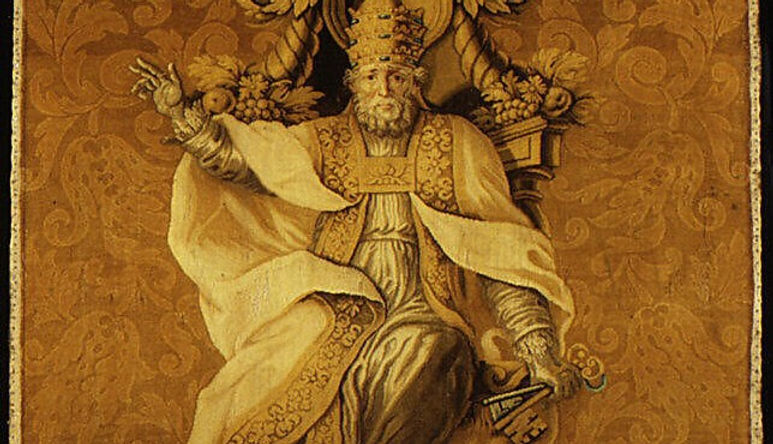St. Optatus of Milevis
Keys, Rock of the Church, Chief of the Apostles, Peter's Faith, Apostolic Lineage, St. Peter
“Therefore none of the heretics possess either the Keys, which Peter alone received.” (St. Optatus of Milevis, Against the Donatists [A.D. 367]).
“So we have proved that the Catholic Church is the Church which is spread throughout the world.
We must now mention its Adornments, and see where are its five Endowments (which you have said to be six), amongst which the Cathedra is the first; and, since the second Endowment, which is the ‘Angelus,’ cannot be added unless a Bishop has sat on the Cathedra, we must see who was the first to sit on the Cathedra, and where he sat. If you do not know this, learn. If you do know, blush. Ignorance cannot be attributed to you—-it follows that you know. For one who knows, to err is sin. Those who do not know may sometimes be pardoned. You cannot then deny that you do know that upon Peter first in the City of Rome was bestowed the Episcopal Cathedra, on which sat Peter, the Head of all the Apostles (for which reason he was called Cephas), that, in this one Cathedra, unity should be preserved by all, lest the other Apostles might claim—-each for himself—-separate Cathedras, so that he who should set up a second Cathedra against the unique Cathedra would already be a schismatic and a sinner. Well then, on the one Cathedra, which is the first of the Endowments, Peter was the first to sit.” (The Schism of the Donatists 2:2 [A.D. 367]).
“To Peter succeeded Linus, to Linus succeeded Clement, to Clement Anacletus, to Anacletus Evaristus, to Evaristus Sixtus, to Sixtus Telesphorus, to Telesphorus Hyginus, to Hyginus Anacetus, to Anacetus Pius, to Pius Soter, to Soter Alexander, to Alexander Victor, to Victor Zephyrinus, to Zephyrinus Calixtus, to Calixtus Urban, to Urban Pontianus, to Pontianus Anterus, to Anterus Fabian, to Fabian Cornelius, to Cornelius Lucius, to Lucius Stephen, to Stephen Sixtus, to Sixtus Dionysius, to Dionysius Felix, to Felix Marcellinus, to Marcellinus Eusebius, to Eusebius Miltiades, to Miltiades Silvester, to Silvester Marcus, to Marcus Julius, to Julius Liberius, to Liberius Damasus, to Damasus Siricius, who to-day is our colleague, with whom the whole world, through the intercourse of letters of peace, agrees with us in one bond of communion. Now do you show the origin of your Cathedra, you who wish to claim the Holy Church for yourselves!...”
“So, of the aforesaid endowments, the chair is, as we have said, the first, which we have proved to be ours, through Peter, and which draws to itself the angelus, unless perchance you claiming him for yourselves, have him shut up in a little place.”
“Catholicism is constituted by a simple and true understanding in the law, by an unique and most true mystery, and by unity of minds. But schism, after the bond of peace has been broken, is brought into existence through passion, is nourished by hatred, is strengthened by envy and dissensions, so that the Catholic Mother is abandoned, whilst her unfilial children go forth outside and separate themselves (as you have done) from the root of Mother Church----cut off by the shears of their hatred----and wickedly depart in rebellion. They are not able, however, to do anything new, or different from that which long ago they learned from their Mother.”
“You have not wished to bring forward the examples to be found in the gospel, as for instance what has been written concerning the person of the most blessed Peter, where we may read a description of the way in which unity is to be obtained or procured. Without doubt it is evil to do anything against a prohibition, but it is worse not to have unity when you can. We see that this unity was preferred to punishment by Christ himself, who chose that all his disciples should be in unity, rather than punish a sin against himself. For, as he did not wish to be denied, he declared that whosoever should deny him before men would he deny before his Father. And though this has been thus written, nevertheless for the good of unity blessed Peter, for whom it would have been enough if after his denial he had obtained pardon only, deserved to be placed before all the apostles, and alone received the keys of the kingdom of heaven, to
be communicated to the rest.” (De Schismate, Book 7)
“And though this has been thus written, nevertheless, for the sake of unity, blessed Peter (for whom it would have been enough if after his denial he had obtained pardon only) both deserved to be placed over all the Apostles, and alone received the keys of the Kingdom of Heaven, which he was to communicate to the rest.” (Against Parmenian 7:3).
“See that you are ignorant that the schism at Carthage was begun by your chiefs. Search out the origin of these things, and you will find that in associating heretics with schismatics, you have pronounced judgement against yourselves. For it was not Caecilian who went forth from Majorinus, your father's father, but it was Majorinus who deserted Caecilian ; nor was it Caecilian who separated himself from the chair of Peter or of Cyprian, but Majorinus, on whose chair you sit, which had no existence before Majorinus himself.” (De Schismate Donatistorum, Book 1:10).

